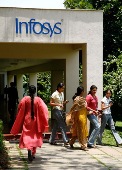 | « Back to article | Print this article |
 It's facing difficulty in finding the right acquisition target at the right price in Europe, its second-largest market.
It's facing difficulty in finding the right acquisition target at the right price in Europe, its second-largest market.
Hence, India's second-largest information technology services company, Infosys Technologies, is adopting a different approach.
It is trying to establish a strong local presence in non-English countries in Europe, while utilising India and China as the back-end to service local customers.
The Bengaluru-headquartered company, which derives close to 26 per cent of its revenues from Europe, mostly from the UK, believes this approach will help it increase its footprint in non-English speaking European countries.
"We are looking at the non-English speaking countries differently. We are taking France and Germany as the first two examples in Europe where we will have a significant presence locally, and that base will provide us with a local front to the customers, with an India or China backend.
That's the model we are experimenting with these countries and we will see how it goes," 'Kris' Gopalakrishnan, CEO and MD, told Business Standard.
Despite their earnest endeavour, Indian IT services companies had not seen much success in continental Europe. Infosys, which had been trying to increase its European revenues significantly over the past few years, has not been very successful in this initiative.
Gopalakrishnan said even though the company was scouting for acquisitions in Europe (there was a buzz that the company was targeting Logica but it soon scotched the rumours), there weren't enough prospective candidates who fulfil all of Infosys' requirements.
"Even if you find the right company (for acquisition), they may say 'I don't want to be acquired'. We are not looking at hostile acquisitions. We are looking at a friendly merger, which means the company must want to be acquired."
Asked how Infosys would succeed in hiring local talent in Europe, which is facing shortage of engineering talent, Gopalakrishnan said Infosys was primarily looking at skill sets in sales, marketing and consulting roles.
These were available in plenty in Europe. This is the reason why India -- which produces a huge number of engineers every year -- was placed in an advantageous position in the foreseeable future, he added.
"Over the years, the number of students coming into engineering is going down in Europe whereas the number in India is going up. That's why it is difficult to find the right number of people well-versed with newer technologies in the local (European) market," he said.
Innovation needed
Infosys has given a revenue growth expectation of 16 per cent in the ongoing financial year.
It is planning to catapult revenues by introducing innovation in its business model and delivering services around point-solutions like ShoppingTrip360 and Flypp, that the company is creating for the customers.
Gopalakrishnan said the company had set a target to derive 33 per cent of its overall revenues through its own IPs and using new business models like transaction-based pricing and volume-based pricing.
The company is hopeful about the success of its new business models like transaction-based pricing, as when 'cloud computing' takes off in global market.
"The industry is gradually moving towards cloud computing. If cloud computing really takes off, transaction-based pricing will also take off. We are already providing cloud-based services to three clients and there are many projects going on where we are helping clients move to the cloud. We are very well set to take advantage of the move," the CEO added.